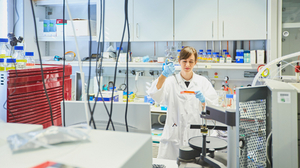Like every other cell type, immune cells need food. Dr. Julia Jellusova at the Cluster of Excellence CIBSS – Centre for Integrative Biological Signalling Studies examines how they respond to starvation and surplus. Metabolism influences the function of these cells, and it may even contribute to their becoming cancerous. Jellusova, an immunologist, aims to find out more about this - and maybe how to put the brakes on lymphoma.
In order to fight many pathogens such as harmful bacteria, the immune system often needs antibodies. But a number of things have to happen before antibodies can be produced. Special immune cells – B cells – meet the pathogen, start to divide, and go through an internal remodeling process and finally produce antibodies. This takes a lot of energy. “The right environment has to be there for these processes to happen,” says Dr. Julia Jellusova of BIOSS and CIBSS, the University of Freiburg’s Clusters of Excellence in the field of biological signalling research. B cells that do not get enough oxygen and nutrients cannot mature properly. “Just how immune cells respond to their environment and regulate their metabolism is a new and exciting topic in immunology,” says Jellusova. Altered nutrient status and defects in metabolism may be important for the development of cancer and autoimmune disorders.
Division happens too fast
“Immunologists always thought that B cells just take what they need,” Jellusova explains. Far from it. B cells respond differently if their environment is not right – if there is a lack of nutrients or oxygen, or if their metabolism is not running smoothly, or if certain regulators fail. The 34-year-old researcher has already investigated one of these regulators: the metabolic brake GSK3. The maturation process of B cells includes strong phases of rapid division. For this exhausting act, the metabolism of these cells must be boosted so that the cells can take in and process more nutrients. But metabolism and cell division should not run too fast – otherwise these processes may get out of control. “GSK3 says to the cell: you are dividing too quickly,” Jellusova says. Then the B cells take in less food, turn down their metabolism and stop dividing.
“I switched off GSK3 genetically,” says Jellusova. In comparison to normal B cells, those with inactive GSK3 divide faster if there is enough food. But they die much sooner if they get hungry. “The cells don’t know when they need to stop reproducing,” she hypothesizes. Sooner or later they run out of nutrients and energy and cells starve. Jellusova wants to answer a number of questions, such as: How exactly does GSK3 work? Why do B cells without GSK3 degenerate and become cancer cells? “Cancer cells often overlook the stop signs,” Jellusova explains. They divide without restraint, and they use up enormous amounts of nutrients to do so. That means cancer cells have to be highly resistant to hunger. Sometimes another protein helps. “It sends survival signals.” And this protein is frequently active in the signal pathways of degenerate B cells. Maybe it even pushes starving B cells with inactive GSK3 to become cancer cells?







